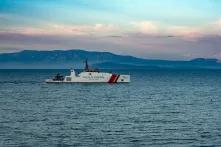In contrast to many declarations that Italy should not be left to face the challenges of mass boat arrivals from North Africa alone, the New Pact's proposals if anything renew the obsolete “Dublin system”.

This commentary is part of our dossier on the New EU Pact on Migration and Asylum.
The Italian reaction to the New Pact on Migration and Asylum can be summed up in one word: disappointment. After frequent announcements at the highest political level that the Dublin system had to be abolished altogether, the Pact presented on 23 September is a blow to countries like Italy with sensitive external borders.
Among the most critical issues regarding the 30-year-old Dublin system is the attribution of responsibility for asylum seekers and refugees to the country of first arrival in the Union, whenever the person has no valid entry documents. More than 90 per cent of asylum seekers have no passports, or entry visas, return tickets to their home country or the financial means of subsistence. Nobody crossing the Mediterranean by boat has the requisites for legal arrival in the Union.
Consequently, under the Dublin rules, the overwhelming majority of asylum seekers are supposed to remain in the “frontline” countries, which have to host them, conduct the asylum procedure and take responsibility for their integration process once international protection has been granted, or, alternatively, for their return home. In practice, these rules were never fully observed and people moved without permission to other countries, otherwise there would be virtually no asylum seekers in the Nordic countries, or in Germany, France, etc.
Relocation of asylum seekers – optional only
The Pact basically maintains the Dublin approach, despite exhaustive research and evaluation exercises proving that the system is paradoxical, inhuman and entirely inefficient. The Commission is making a timid attempt to introduce new elements under the flag of intra-EU solidarity and mutual trust between member states. There has been a broad debate, based on the position taken by the European Parliament in 2017, on a policy of obligatory relocation of asylum seekers from the country of first arrival to other countries according to an allocation key.
This would have been a true show of solidarity with the southern member states. Moreover, it would have included the concept of Europe as a whole being an asylum territory. A person arriving in Italy or Greece, for example, would apply for asylum not to these countries but to the Union as an entity in its own right. The geographic location of a member state would no longer be the decisive factor for attributing responsibilities.
The “Regulation on asylum and migration management” proposed by the Commission as part of the Pact, consisting mainly of a “Dublin 4” instrument, does not include the obligation of states to relocate asylum seekers on their territories, other than those who are disembarked following a rescue operation at sea. However, even in this case the relocation mechanism would be only be triggered for those who are not subject to the border procedure.
Border procedure for the majority
Under the proposal, all member states would be obliged to introduce accelerated asylum procedures at borders prior to admitting asylum seekers who have arrived from a safe third country, or who are originally from a safe country of origin, or who present a manifestly unfounded claim. The notion of safe country of origin is extended to all those of a nationality for whom less than 20 per cent, at the EU average, are granted international protection.
In the case of Italy, the vast majority of asylum seekers arriving by sea in 2020 are of these “safe” nationalities, such as Tunisians, Bangladeshis, Algerians and Pakistanis. They would not fall under the relocation scheme even if they had been rescued. And Italy would be obliged to re-admit those who had eventually managed to travel irregularly to other European countries.
Some light at the end of the tunnel
Some features of the Pact might, however, help countries like Italy. Extraordinary migration pressure on one or several member states, in particular those with external land or sea borders, would activate an EU solidarity response coordinated by the European Commission with the support of the future European Asylum Agency.
The clear statement that rescue at sea is an international legal obligation and therefore not punishable should stop criminal proceedings against operators of NGO rescue ships and the seizure of these ships. Italy in fact adopted new legislation in October 2020 abolishing penalties for rescue operations, in contrast to the previous “Salvini-Decree”.
The Commission also proposes to reduce the period of residence required for beneficiaries of international protection to obtain a long-term EU residence permit and the right to move freely on EU territory from five years to three.
One may expect the Italian government, possibly in collaboration with other Mediterranean member states, to make all efforts in the Council to amend the Commission´s proposal regarding the Dublin system and to reach a truly European solution based on the principle of solidarity and on the treaty obligation to uphold the right to asylum.



